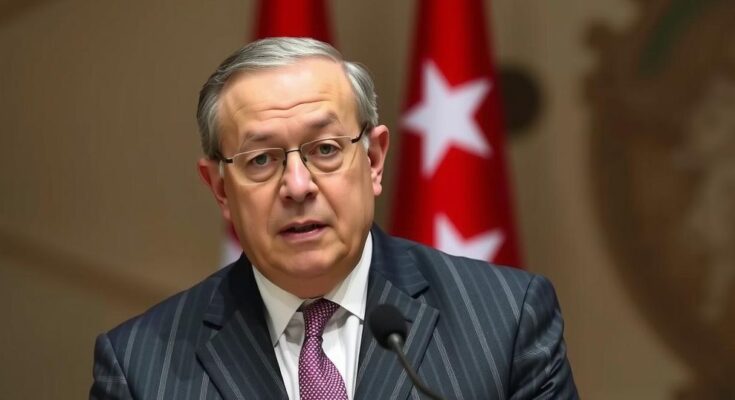Turkey’s Foreign Minister has urged for the immediate lifting of sanctions on Syria to support the country’s recovery after years of conflict, emphasizing the role of the international community. Turkey is actively involved in Syria’s political transition and aims to assist in drafting a new constitution while simultaneously looking to repatriate millions of Syrian refugees.
In a recent statement, Turkey’s Foreign Minister Hakan Fidan emphasized the need for the immediate lifting of sanctions on Syria during his visit to Damascus. He asserted that these long-standing sanctions are hindering Syria’s economic recovery following over a decade of conflict, stating, “The sanctions imposed on the previous regime need to be lifted as soon as possible.” Fidan called upon the international community to take action to facilitate Syria’s reconstruction and enable the return of displaced citizens.
Moreover, the Turkish government is keenly involved in the political transition following the overthrow of Bashar al-Assad’s administration. President Recep Tayyip Erdogan revealed that Ankara is collaborating with prominent figures, including Hay’at Tahrir al-Sham (HTS) leader Ahmed al-Sharaa, to draft a new constitution for Syria, deemed essential for the nation’s future stability. Despite the lack of direct support for HTS from Turkey, their interactions have intensified over the years. Reports suggest that Turkey facilitated the operation that sparked the recent events leading to Assad’s exodus from power. Additionally, Turkey aims to repatriate millions of Syrian refugees who have sought asylum in Turkey since the outbreak of war in 2011. Turkey’s intelligence chief Ibrahim Kalin made a notable visit to Damascus shortly after Assad’s removal from power, marking a pivotal moment in Bashar al-Assad’s political downfall.
The current geopolitical climate in Syria is heavily influenced by more than a decade of civil conflict, which has devastated the nation’s economy and caused widespread displacement. The sanctions imposed by Western countries in response to the Assad regime’s actions have further exacerbated the humanitarian crisis. Turkey, which shares a border with Syria, has been deeply engaged in the intricate web of Syrian politics and is particularly interested in shaping the post-Assad landscape. The Turkish government hopes that lifting sanctions would not only promote stability in Syria but also provide better conditions for the return of Syrian refugees residing in Turkey. This latest call from Turkey’s foreign minister marks a significant shift in diplomatic efforts regarding Syria’s reconstruction.
In conclusion, the Turkish Foreign Minister’s call for the upliftment of sanctions on Syria underscores the necessity of international collaboration for the nation’s recovery post-conflict. This move reflects Turkey’s strategic involvement in the transitional governance of Syria and its commitment to facilitate the return of displaced individuals. As the situation evolves, Turkey’s proactive stance may play a pivotal role in determining the future political and economic landscape of Syria.
Original Source: www.middleeasteye.net




